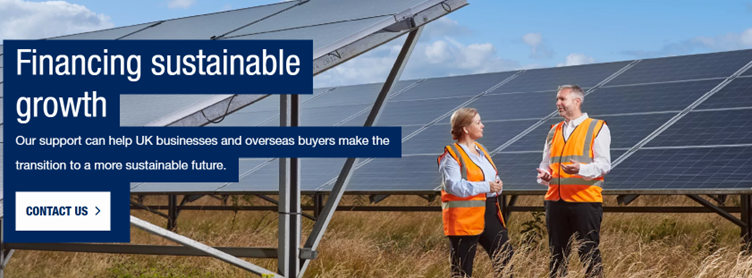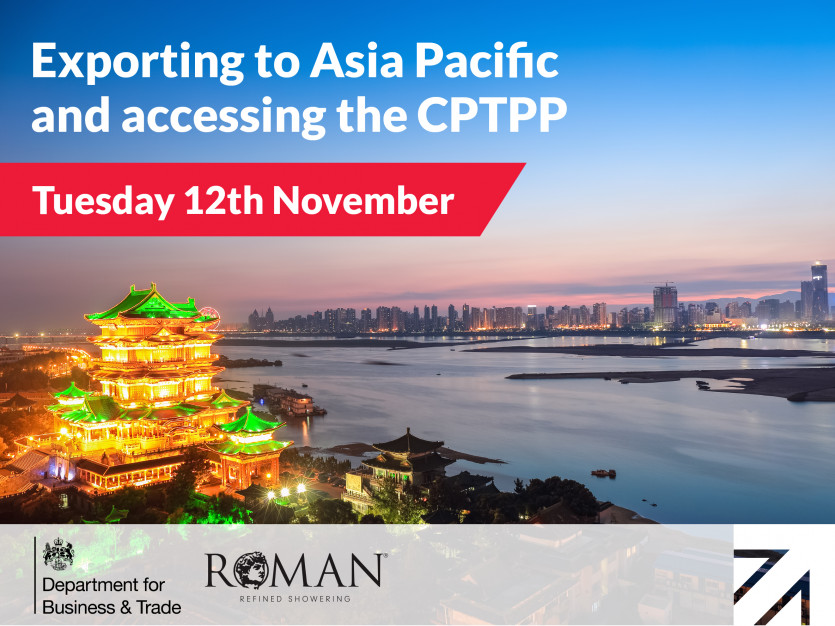1. Unlocking New Markets: UK Manufacturers and the CPTPP
As the UK prepares to join the Comprehensive and Progressive Agreement for Trans-Pacific Partnership (CPTPP) by the end of 2024, Made in Britain is hosting an insightful online session on November 12th. This event aims to equip UK manufacturers with the knowledge and connections needed to successfully export to the Asia Pacific region.
Event Highlights
The session will feature presentations from two UK manufacturing companies, including Roman Ltd, which has a strong track record of exporting to over 70 countries. Attendees will also hear from the UK Department for Business and Trade’s Asia Pacific team, who will provide valuable advice on leveraging the benefits of the CPTPP.
Why the CPTPP Matters
The CPTPP is a significant free trade agreement that spans five continents and nearly 600 million people. For UK businesses, this means that more than 99% of current goods exports to CPTPP members will be tariff-free once the agreement comes into effect on December 15th. This is expected to boost the UK economy by around £2 billion annually by 2040.
Opportunities for UK Manufacturers
The Asia Pacific region, which includes countries like Australia, Japan, Malaysia, Singapore, and Vietnam, presents vast opportunities for UK exporters. The event will provide practical examples and real-world insights from experienced exporters, making it particularly valuable for both new and seasoned businesses looking to expand their reach.
Interactive and Informative
Made in Britain’s CEO, John Pearce, will open the session, which will be facilitated by George Middleton, an international trade and supply chains specialist. The event promises to be interactive, with ample time for Q&A, allowing attendees to ask specific questions and gain tailored advice.
Join the Conversation
This session is part of Made in Britain’s ongoing efforts to support UK manufacturers in growing their exports. Whether you are just starting out or looking to enhance your existing export strategies, this event is a must-attend.
For more details and to register, visit Made in Britain.
2. Chinese Automotive Manufacturer sets up in Serbia

Magelan CC BY-NC-SA 2.0 https://creativecommons.org/licenses/by-nc-sa/2.0/
In a significant move to expand its footprint in the European market, Shanghai Huizhong Automotive Manufacturing (SHAC) has announced plans to set up a new factory in Novi Sad, Serbia. This development marks SHAC’s first manufacturing facility in Europe, highlighting the company’s strategic push into the region’s automotive sector.
The new factory, which will be located within the CTPark Novi Sad East industrial zone near the Kać interchange, is set to produce vehicle chassis for the European market. The project is expected to create approximately 150 jobs, providing a substantial boost to the local economy.
The announcement was made following a visit by Milan Đurić, the mayor of Novi Sad, to SHAC’s plant in Shanghai. During this visit, Đurić signed a contract with SHAC’s management, solidifying the plans for the new facility. While the exact value of the investment has not been disclosed, Đurić emphasized the positive economic impact the factory will have on Novi Sad, including contributions to GDP growth and increased local government revenue from property and wage taxes.
SHAC, established in 1992, is a prominent manufacturer of heavy-duty trucks, buses, minibuses, and vans. The company’s history in the automotive industry dates back to 1958, when it assembled its first truck in China. This new venture in Serbia is part of SHAC’s broader strategy to enhance its global presence and market share in the automotive industry.
The factory is slated to open by the end of 2025, and it is expected to significantly improve the global standing of Novi Sad. This investment underscores China’s growing interest in the European automotive market and reflects SHAC’s commitment to expanding its operations internationally.
3. Nvidia to Announce Thailand Investment Plans

Uwe Schwarzbach CC BY-NC-SA 2.0 https://creativecommons.org/licenses/by-nc-sa/2.0/
In a significant move set to bolster Thailand’s technological landscape, Nvidia the US tech company is poised to announce its investment plans for the country this December. The announcement will be made during CEO Jensen Huang’s visit to Bangkok, as confirmed by Thailand’s Commerce Minister, Pichai Naripthaphan.
Strategic Investment in Southeast Asia
Nvidia’s decision to invest in Thailand is part of a broader strategy to expand its footprint in Southeast Asia. This region has become increasingly attractive to global tech giants due to its strategic location, robust infrastructure, and growing market potential. The investment is expected to focus on advanced AI technologies and data centers, aligning with Thailand’s ambitions to become a hub for high-tech industries.
Boosting Thailand’s Economic Prospects
Minister Naripthaphan highlighted that Nvidia’s investment could trigger a wave of related investments, further enhancing Thailand’s economic prospects. “This could lead to more investment interests with related clusters following suit,” he stated.
A Step Towards Technological Advancement
Nvidia’s investment is seen as a pivotal step towards modernizing Thailand’s manufacturing base and elevating its status as a technological hub. The company, renowned for its cutting-edge AI chips and high-performance computing solutions, will bring valuable expertise and resources to Thailand.
Conclusion
As Nvidia prepares to unveil its investment plans, Thailand stands on the brink of a technological transformation. This investment not only underscores the country’s growing appeal to global tech firms but also marks a significant milestone in its journey towards becoming a leading player in the high-tech industry.
4. German Outward FDI Up, Inward Lower

Daniel Mennerich CC BY-NC-ND 2.0 https://creativecommons.org/licenses/by-nc-nd/2.0/
In recent years, Germany has experienced a notable trend in its foreign direct investment (FDI) dynamics. While German firms continue to invest robustly abroad, the value of inward FDI flows into Germany has seen a significant decline.
Strong Outward FDI from Germany
German companies have been actively investing in foreign markets, with outward FDI flows remaining strong. Between January 2019 and July 2024, German FDI rose cumulatively by nearly €1,700 billion. This trend highlights the strategic expansion of German enterprises, particularly in the United States and the euro area, which together account for more than half of German equity capital held in manufacturing.
The energy-intensive sectors in the United States have seen a sharp increase in German FDI, driven by relatively lower production costs and favorable economic conditions. Additionally, German investments in China and other G20 emerging economies have grown, although new FDI in China has been cautious due to cooling economic growth and strong incentives for locating production in the United States.
Declining Inward FDI into Germany
Contrasting the robust outward FDI, inward FDI flows into Germany have been on a downward trajectory since 2022. From the end of 2019 to June 2024, foreign investors increased their equity capital in Germany by a cumulative €163 billion. However, this growth has slowed significantly, with a marked reduction in new investments from the euro area and other third countries.
Several factors contribute to this decline. High energy prices in Germany have made it less attractive for foreign investors, who are now favoring other European countries like France and Spain1. Additionally, the geopolitical landscape, including the aftermath of Brexit and the ongoing impacts of the coronavirus pandemic and Russia’s attack on Ukraine, has reshaped international supply chains and investment decisions.
Implications for Germany’s Competitiveness
The reduced inward FDI flows raise concerns about Germany’s international competitiveness as a business location. To maintain its attractiveness, Germany must address the challenges posed by high energy costs and demonstrate its ability to offer a favorable investment climate amid stiff global competition.
In conclusion, while Germany continues to be a significant player in global FDI through its robust outward investments, the decline in inward FDI flows signals a need for strategic adjustments to enhance its appeal to foreign investors.
5. UK Export Finance and green energy

In recent years, the UK government has significantly bolstered its support for green energy exports through UK Export Finance (UKEF). This strategic backing is not only propelling the UK’s renewable energy sector onto the global stage but also contributing to the worldwide transition towards a low-carbon economy.
UKEF’s Role in Green Energy
UKEF, the UK’s export credit agency, plays a pivotal role in ensuring that no viable UK export fails due to lack of finance or insurance. By leveraging the public balance sheet, UKEF provides essential financial support to UK businesses, enabling them to compete in international markets. This support is particularly crucial for the green energy sector, where substantial upfront investments are often required.
Strategic Initiatives and Achievements
Since 2019, UKEF has committed over £800 million to renewable energy projects. This includes financing for offshore wind farms in Taiwan and solar-powered clean water projects in Ghana. These initiatives not only showcase the UK’s expertise in renewable technologies but also highlight the government’s commitment to sustainable development.
In 2020, the Chancellor allocated an additional £2 billion to UKEF’s direct lending facility to further accelerate support for clean growth and renewable energy projects. This funding has enabled UKEF to provide direct loans to overseas buyers of UK renewable goods and services, creating new opportunities for the UK supply chain.
Case Studies: Success Stories
One of the most notable projects supported by UKEF is the £1.7 billion deal for monorails in Cairo, Egypt. This project, the largest amount of financing UKEF has ever provided for an overseas infrastructure project, underscores the UK’s capability in delivering large-scale sustainable infrastructure.
Another significant achievement is UKEF’s support for offshore wind farms in Taiwan, where it has provided £500 million in credit guarantees. These projects are instrumental in helping Taiwan meet its renewable energy targets and demonstrate the UK’s leadership in offshore wind technology.
Future Outlook
Looking ahead, UKEF’s Sustainability Strategy 2024-29 aims to position UK exporters at the heart of the global low-carbon transition. This strategy includes ambitious targets for increasing support to clean growth sectors and reducing the carbon footprint of its portfolio. By aligning its financial products with sustainability goals, UKEF is set to play a crucial role in driving the global green energy agenda.
Conclusion
The UK government’s backing through UKEF is proving to be a game-changer for the green energy sector. By providing the necessary financial support and leveraging the UK’s expertise in renewable technologies, UKEF is helping UK green energy companies to thrive on the global stage. This not only boosts the UK economy but also contributes to the global fight against climate change.







